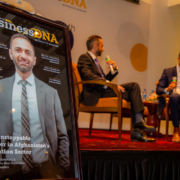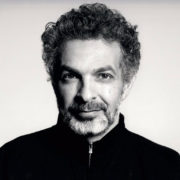Meet the Young Secret Serial Entrepreneur of Afghanistan
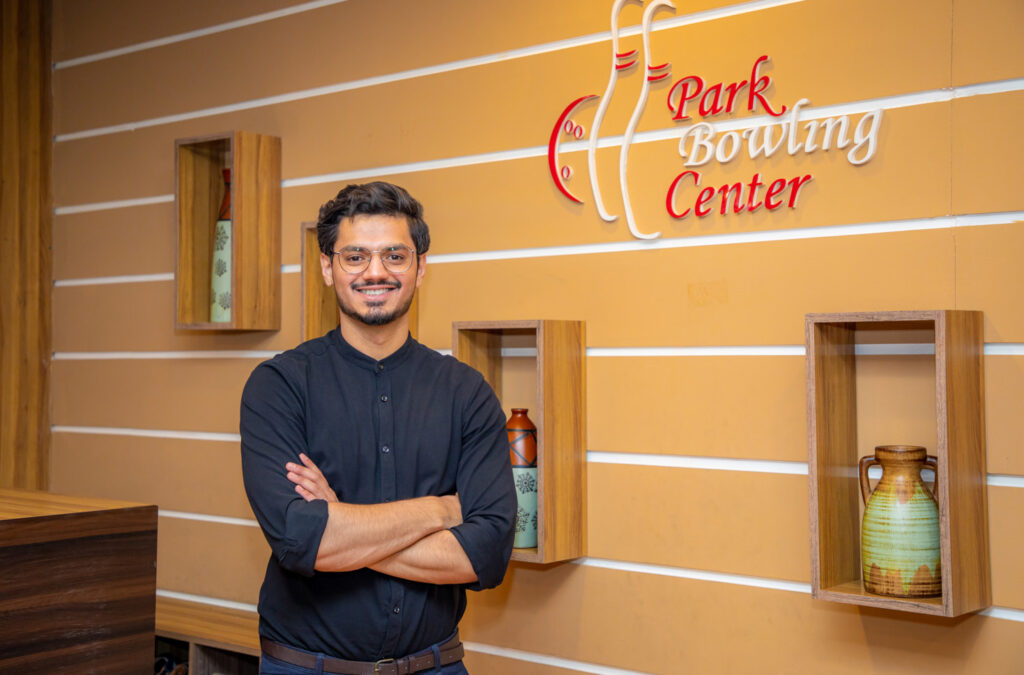
By Sara Wahedi & Jamshed Habibi
Soaring high from humble beginnings, Farshaid Rafi shares with us his secrets of not only one, but five successful businesses in Kabul, and why only focusing on profit rarely results in a sustainable and thriving successful endeavor. He tweets at @farshaid
Where in the pantheon of Afghan business leaders does Farshaid Rafi belong? If you are well-versed in the business world of Afghanistan, the name may not immediately ring a bell – that’s on purpose, Farshaid says. Still, we’re certain that you’ve heard of his establishments or have even visited them yourself. Born in Kabul province in 1993 to a middle-class family, Farshaid Rafi lives, breathes, and dominates the business of entertainment and education in Kabul.
Farshaid’s first business can be found at Ansari Square – or Kabul’s “quasi-Times Square” – where an enormous digital billboard faces out onto Shahr-e Naw, flooding the streets and nearby homes with bright neon reds and blues until the late hours of the night. Park Mall, Kabul’s most popular shopping mall, is nestled between Kabul City Center and a long line of makeshift businesses. Staring up at the building with its muted business center aesthetic, it seems impossible that a complete escape from the city called “Shahre Baazi” could be found on Park Mall’s topmost floor.
Shahre Baazi is Afghanistan’s largest indoor amusement park, largely successful due to its prime location and design for the uncertainty of daily Afghan life. Stepping inside from its domed entrance, colorful carousels and shrills of laughter instantly grip you, transporting you to a place that feels more like Disneyland Paris than Kabul city.

The brains behind Shahre Baazi and five other establishments – with two more in the works – doesn’t boast the typical “businessman” aesthetic. While waiting to speak with Farshaid, we were greeted by a few members of his team in the process of opening Shahre Baazi for the day. As they shuffled in with their morning greetings and bursts of laughter, Farshaid was a stark contrast with his humble demeanor and reserved posture. That humbleness would be a key theme throughout our conversation. “You’ll never hear me talk about the negative aspects of my fellow competitors in business. We should always applaud the successes of our competing businesses. I don’t believe there is any need to share reservations or doubts about them publicly – the shortcomings of others are best kept to oneself. It’s a sign of ultimate respect.”
Farshaid consistently refers to his success in business as a ‘team effort’, starting from his family. As the second youngest child out of eight siblings, he says that overachievement is a norm among them. At five days old, Farshaid and his family went underground as the Taliban entered Kabul. They then moved to Mazar-e-Sharif for two years before settling in Pakistan. Farshaid completed primary school in 2003, and moved back to Kabul with his family following the Taliban’s ousting from power. “Before my father, there were no entrepreneurs or businessmen in my family. It all started with him and my older brother, Kiomars.
Their sacrifices and work ethic continue to drive my business endeavors.” From his father to his older brother to Farshaid, doing business would become an inescapable and driving force that is surely just the beginning for the Rafi family’s upcoming generations.
“You need to enjoy the journey you’re on. If the business is successful but exhausting, walk away from it. You need to have that thirst to wake up in the morning and run to work. If it’s just about the numbers, you won’t be able to sustain it unless you are happy.”
From the age of 12, Farshaid was always observing the world of business under the wings of his older brother, Kiomars. It was at this time that his curiosity with numbers was ignited. He had an interest in accounting, finance, and how math helped make sense of everything.
Farshaid went on to complete his secondary education at Lycée Estiqlal – a Franco-Afghan school in Kabul – at that time passionate about pursuing a career in engineering. As experienced by many graduates before him, the Kankor exam results had other plans for Farshaid. Missing the required grades for engineering by a fraction, he ended up with a short stint at Kabul University’s Economics faculty before pursuing a Bachelor’s degree in Finance from Indira College of Commerce and Science in Pune, India. The influence of India, Farshaid says, would fundamentally change him forever.
“Initially, I decided to study in India because of my other brother, Kambaiz. Throughout my life, I’ve tried to emulate Kambaiz, in his educational and career goals. Both his personality and his knowledge were inspiring to me – and that is how I found myself in India, because he studied there as well.”
Before moving to India, Farshaid’s life was like many young Afghan boys in Kabul, comprising of
studies, football, and family. The idea of living a completely independent life was – at first anyway – a faraway concept to him. “When I arrived in India, everything was new. I was starting
from zero. I had to completely reinvent myself from who I was before. When you’re in a safe zone, and your family makes most of your decisions, you cannot understand and pick apart who you are. Traveling and living independently is a necessary and important step in becoming you; life has to be set by your parameters.”
When we asked him about how an education in Afghanistan would have turned out for him? “Honestly, if I were to have completed my studies in Afghanistan, I would not be the Farshaid Rafi I am today. I would have been in my comfort zone with my family, and my personal growth would be minimal if none at all. A diamond is nothing more than a clump of carbon. It needs pressure and time to reach its farthest potential. Humans are like that.”
“Our people are skilled, and our potential is limitless, but we have become used to the culture of importing. We need to change that.”
According to Farshaid, high school graduates need to experience the journey of self-actualization. They should know that the educational institutions in Afghanistan often fall short in preparing the next generation of innovators, change-makers, and leaders. “I was enrolled for one semester at Kabul University studying economics, but the instructors would mostly speak about themselves and their stories. There wasn’t much to learn. About 10% of the lecture was attendance, 70% was about the professor and their past, and 20% was some teaching. The thirst and drive to inspire weren’t there.”
It is worth adding that India’s education system also has its pros and cons. In one heartbreaking example occurring earlier this year, a 24-year-old college student from Afghanistan allegedly committed suicide because he did not meet the required grades in his bachelor’s degree in business due to a failed paper. (1) Suicide rates and stress levels are regrettably high in India, with no signs of abating soon. “Education in India taught me to be a hard worker, pushing me from all corners. It doesn’t teach you how to become an entrepreneur, but rather how to function in difficult environments. You see and experience things there that you would never come across in Afghanistan.”
During this time, Farshaid states that his first year in India was all about the exposure to a new world: to make mistakes, learn from them, and live the life of a young college student. His second year was his period of self-understanding, in which he began connecting with his virtues and foundation. His last year in India was about creating the blueprint for his future business endeavors in Kabul. “During my last year, I was visiting Kabul during every holiday and taking steps to bring my business plans to life. I was identifying market opportunities for business in Kabul – what the city needed, what was missing, and what people could afford. It became clear to me that entertainment and education were two areas of business that had the greatest potential, in my opinion.”
After graduating in 2013, Farshaid returned to Kabul to get to work but soon realized that this new period of his life would take away other goals he had set for himself. “After graduation, my brother told me to be realistic with myself and come to terms with the fact that I would never pursue graduate studies at the master’s level. I wanted to work for two to three years and obtain
some experience and then study. My brother laughed at me and said that he wanted to do the same, and it’s been fifteen years. He was right. Six years have passed for me, but I have no definite plans for a Master’s degree now.
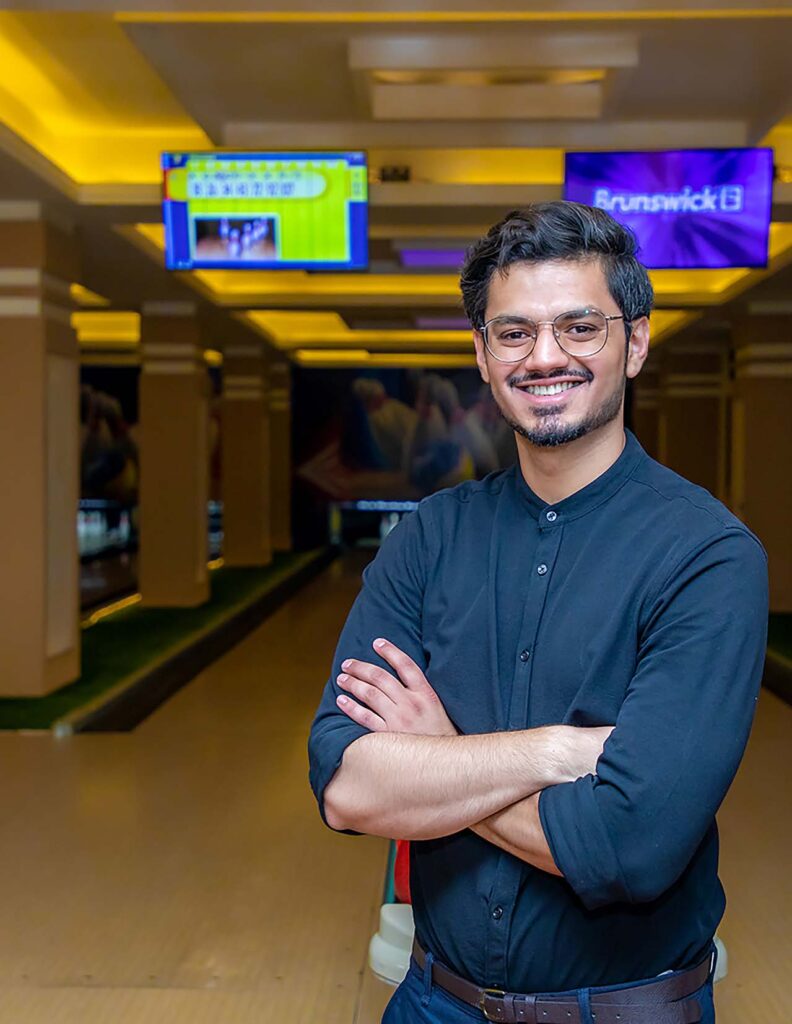
“In 2012, I had consolidated my plans for what I needed to do, and migrating out of Afghanistan wasn’t in it. I plan to slowly expand and grow my businesses, but they are all based in Afghanistan, so my place is here.”
Farshaid recruited an expert in the entertainment business from Iran to help him design Shahre Baazi as no one in Afghanistan had experience in creating an indoor amusement park. It was then that he faced a reality check on his projections, realizing that his plan to open three branches of Shahre Baazi would barely be enough to cover the costs of one. “We were still able to recover despite the significant deviation from our projections, luckily we have remained successful. It was a big gamble, but it was the most important decision I’ve ever made.
“Money has never motivated me. I love the journey. If there isn’t an opportunity to learn, you won’t grow. We always need to be focused on growing and improving, which is integral in business as well.”
Farshaid imagines that if he had started from zero, he would have focused on agriculture and production sectors in Afghanistan, as they are the most in-demand and have the most potential. Like cotton, ample raw materials can be found in many parts of Afghanistan and can be high quality. Farshaid states that the issue isn’t scarcity, but mismanagement and a lack of marketing to global business markets. “Zara, H&M, and countless others have production centers in Bangladesh or India, but why not Afghanistan? It’s the same in the food industry. We import millions of eggs from Iran and Pakistan. Why aren’t we able to manage this need on our own? Our people are skilled, and our potential is limitless, but we have become used to the culture of importing. We need to change that.”
Farshaid’s passion and patriotism emanated instinctively throughout every topic of our conversation, and we wondered what kept him in the country despite having the chance to live abroad after his studies in India. “In 2012, I had consolidated my plans for what I needed to do, and migrating out of Afghanistan wasn’t in it. I plan to slowly expand and grow my businesses, but they are all based in Afghanistan, so my place is here.”

The “slow” growth of his business is an understatement, to say the least. It is rare to see Shahre Baazi without a sea of children and families occupying every corner of the amusement park, similar to his two bowling alleys, Park Bowling in Shahre Naw, and Friends Bowling in Karte Char. With Shahre Baazi catering to the needs of families with small children, teens and young adults are usually not allowed to enter the premises due to the safety and comfort of those bringing their children for a day of fun. “None of our businesses have steel doors or VIP access. They are for the middle-class, which is why we launched the bowling alleys, so Kabul youth would also have somewhere to enjoy.” The profitability timeline of Farshaid’s businesses is remarkable, with Shahre Baazi breaking even within a year, Park Bowling and Friends Bowling in about two years, and Mehr Kindergarten in three.
In line with his focus on children, Farshaid says that creating a kindergarten and entering the education market is the most natural transition for him. Mehr Kindergarten – located in Qalai Fatullah – is a curriculum-based center focusing on individualized teaching and character growth. Teachers follow pre-planned curriculums, a psychologist meets with parents weekly to talk about the mental and emotional growth of their children and create plans for how to facilitate their learning beyond the classroom. It’s an innovative and unprecedented type of learning environment in Kabul, which Farshaid plans on extending with the establishment of a primary school by late 2021. True to his humble personality, Farshaid listed the positive attributes of educational institutions such as Afghan Turk, Kardan International School (KIS), and Kardan High School. “At the end of the day, the school and curriculum don’t matter much when your teachers aren’t inspiring and supporting their students. Teachers are the foundation, and without them, any curriculum is useless.”

Farshaid credits his team for being the teachers in his life. “I have to emphasize the importance of building a good team. Without them, it’s impossible to get anywhere. You’re able to brainstorm, fill in the missing pieces, collaborate, and be challenged. They aren’t meant to be your ‘yes’ people. Farshaid says that the success of his businesses is also due to the relentless planning that took place at the early stages of his businesses, through numerous, iterative SWOT analyses. “Even when you do your projections and planning well, something like the COVID-19 pandemic can occur, and it all goes sideways.”
“Your first customers are your employees. You cannot expect your employees to be loyal to you when you don’t return their loyalty and support them in times of need.”
COVID-19, much like the global experience of this pandemic, has debilitated Afghanistan to its core. With the former Minister of Public Health, Ferozuddin Feroz stating that over 80% of the population could contract COVID-19, Afghans are struggling to manage another crisis on top of an already fragile peace process, chronic unemployment, and staggering levels of poverty. “The pandemic has been a reality check. We realize that, more than ever, shelter, food, and our well-being are the most important things in life.” Farshaid’s focus during the pandemic has been to keep his 200 employees afloat. Though his businesses were shut down during the quarantine, he made sure that his staff received their salaries and were otherwise supported, recognizing that they too had loved ones to look after.
“Your first customers are your employees. You cannot expect your employees to be loyal to you when you don’t return their loyalty and support them in times of need.”
When speaking about his foundational values, Farshaid refers to the COVID-19 pandemic as one of the times he put his values to work. “The thing that I am most proud of is that I can help 200 people feed their families through sustainable, honest work. Money has never motivated me. I love the journey. If there isn’t an opportunity to learn, you won’t grow. We always need to be focused on growing and improving, which is integral in business as well.”
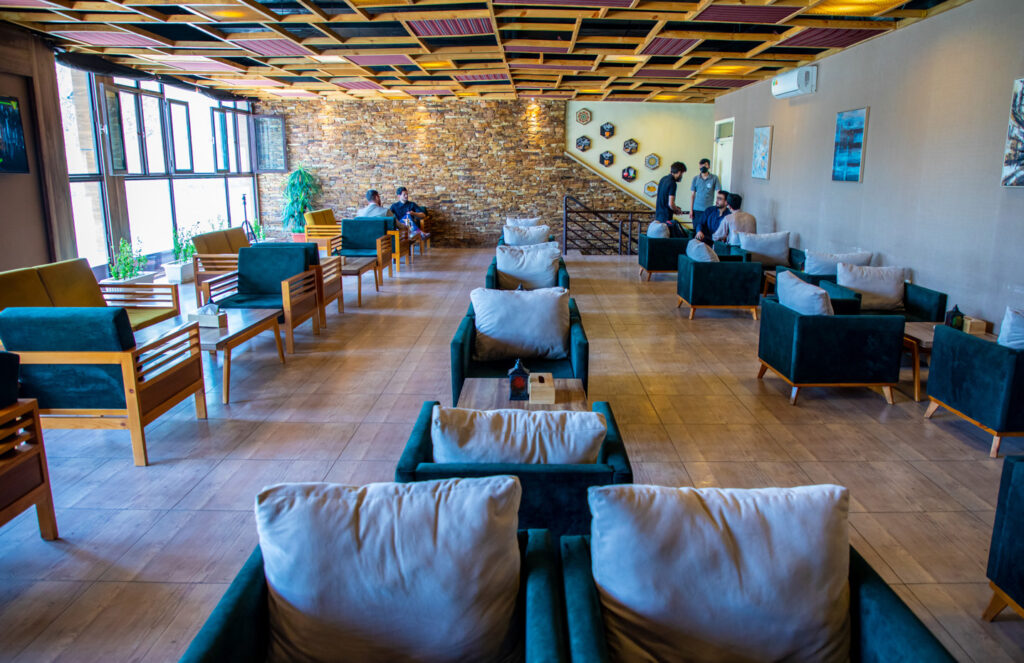
As the post-COVID-19 Afghanistan unfolds, Farshaid plans to get back to work on the primary school, additional locations of Shahre Baazi and Friends Bowling, and revitalizing Gandoom restaurant, his most recent project. “If I could recommend businesses for entrepreneurs to consider, it would be movie theatres and the sustainable music industry. The entertainment sector has a great deal of potential.” He also addresses investors within Afghanistan and abroad that the instability and insecurity will continue to haunt Afghanistan’s private sector. “It isn’t just the insecurity, but also the government of the day. We have no idea what the government will look like after five years, and that is a gamble that only a few would like to take.”
Farshaid says he plans to retire at thirty-five and focus on philanthropy and humanitarian endeavors, stating that he believes he has already attained success in his eyes. “I’ve been incredibly successful in my life. Yet, maybe not the way society measures it. For me, success is measured by the relationships in my life with my team, friends, and family.”
As our conversation came to a close, Farshaid asked us whether we knew of Afghanistan’s average life expectancy: “60 years” at best. “It means we have about half our life left. That’s an important wake-up call for me and why I want to look back and see my journey as a part of my life and who I am. We never remember when we got 95% or 65% on that exam. It sobers us up when we’re older.”

While exchanging goodbyes, Farshaid asked us whether we’d like to join in on a bowling game. Leaving the invitation for another day, we watched him mesh in with the rest of the players as effortlessly as one could imagine, landing a “strike” within seconds. Farshaid Rafi’s businesses speak on his behalf, while he guides them along humbly from the sidelines.
Farshaid’s Top Lessons Learned as an Entrepreneur:
- Learn when to say yes and when to say no. You should pay attention to the graphs, projections, and plans – just because your brother, best friend, or mentor gives advice to you to do something, it does not make it worthy of acting on. Instead, follow the evidence.
- You need to enjoy the journey you’re on. If the business is successful but exhausting, walk away from it. You need to have that thirst to wake up in the morning and run to work. If it’s just about the numbers, you won’t be able to sustain it unless you are happy.
- Whatever work you start with, remember that the most important customer is your employee. They are the public face of your business, everything begins with them. A great manager of your employees is like a parent, a therapist, and a leader. The dynamic between you and your employees needs to be about collaboration, respect, and mentorship.
- An idea that is interesting to you may not necessarily be interesting to your target audience. You need to brainstorm and discuss your ideas with those around you and those you wish to target as your customers. You need to undertake proper market analysis and understand what you’re getting into, followed by a robust business plan that leads you to where you want to go.


